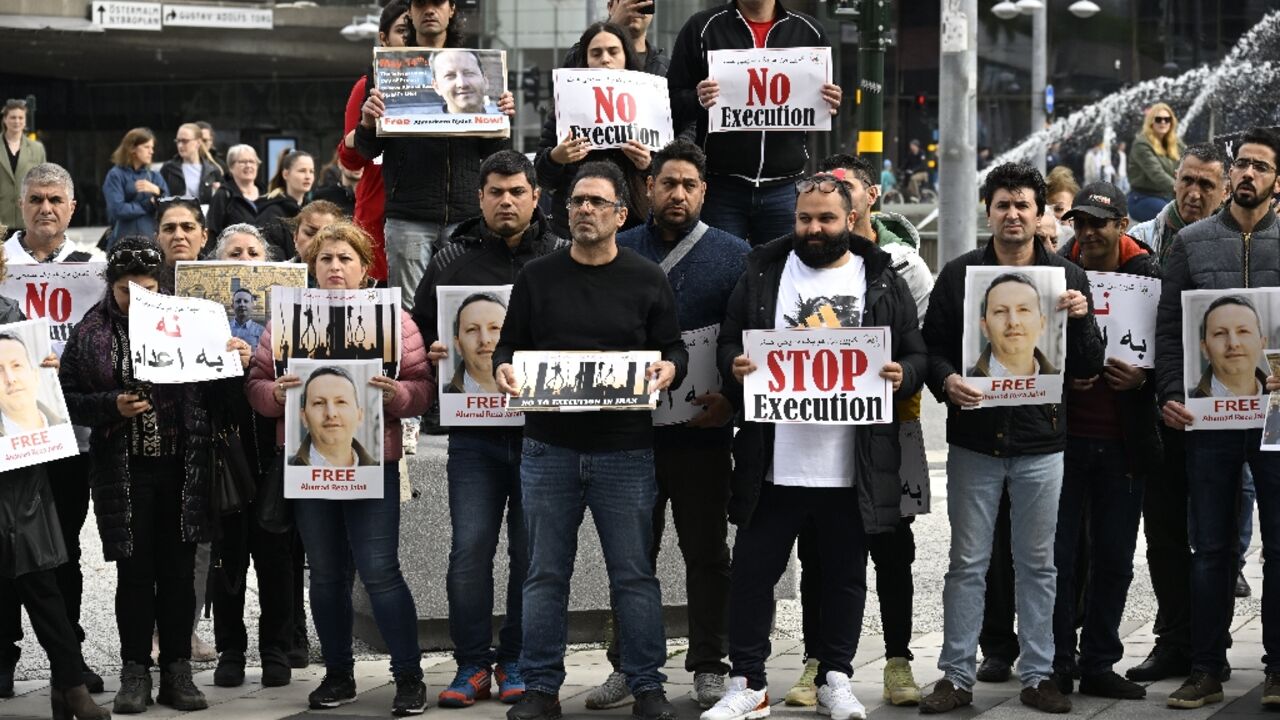Swedish citizen risking Iran execution is 'hostage': Amnesty

An Iranian-Swedish citizen facing imminent execution in Iran is being held as a hostage by Tehran in a bid to force Belgium and Sweden to make concessions in two cases concerning former Iranian officials, Amnesty International said Thursday.
Ahmadreza Djalali was sentenced to death in 2017 on espionage charges that are deemed baseless by Stockholm and his supporters, and Iranian media reports say he could be hanged by May 21, a punishment that officials have repeatedly insisted will be carried out.
The risk to his life comes as anger grows among families of Western nationals often held for years on end by Iran, who they say are being held as pawns in a game over which the innocent detainees have no control.
"Mounting evidence strongly indicates that the Iranian authorities are holding... Djalali hostage and threatening to execute him to compel third parties to swap him for former Iranian officials convicted or on trial abroad, as well as to refrain from future prosecutions of Iranian officials," Amnesty International said.
In an unprecedented case, a Swedish court is trying Hamid Noury, a former prison official, over his alleged involvement over massacres in Iranian prisons in 1988, with the verdict expected on July 14.
Noury, who was arrested in Sweden in November 2019, is being tried under the principle of universal jurisdiction, which allows states to investigate serious crimes that were committed abroad.
Meanwhile, Assadollah Assadi, a former Iranian diplomat, is serving a 20-year prison sentence in Belgium for his role in a thwarted 2018 bomb attack in France that was targeting a meeting of an exiled opposition group.
Before his arrest in Iran in April 2016, Djalali was a visiting professor in disaster medicine at the Vrije Universiteit Brussel, a research university in Brussels.
Sweden later granted citizenship to Djalali, who had been a resident in the country, in February 2018.
- 'Hostage-taking machine'
"The Iranian authorities are using Ahmadreza Djalali's life as a pawn in a cruel political game, escalating their threats to execute him in retaliation for their demands going unmet," said Diana Eltahawy, Amnesty's deputy director for the Middle East and North Africa.
"The authorities are attempting to pervert the course of justice in Sweden and Belgium, and should be investigated for the crime of hostage taking," she said.
The London-based NGO says that since at least late 2020, the Iranian authorities had been "conditioning" Djalali's fate on seeking a "deal" with Belgium to swap him for Assadi, and with Sweden for Noury.
The UN Human Rights Office had said Tuesday that it was "deeply alarmed" by reports that Djalali's execution was imminent, saying his hanging would "constitute an arbitrary deprivation of life."
Djalali's supporters, led by his wife Vida Mehrannia, have also sought to keep up the pressure, with his 10-year-old son holding up a sign reading "Free My Dad" at a protest in Stockholm last week where he was joined by his classmates.
Over a dozen Western nationals are being held in Iran in what activists argue is a policy of hostage-taking aimed at extracting concessions from the West. Two more French citizens were detained earlier this month.
Meanwhile, German citizen Jamshid Sharmahd and Swedish citizen Habib Chaab are being tried on security-related charges for which they could be sentenced to death. Activists believe both were abducted by Iran while abroad.
These controversies are coming at an acutely sensitive time for Iran, as world powers are still seeking to revive a 2015 deal over its nuclear programme, and as the country is confronting protests over price rises.
Families and supporters of foreign detainees held in Iran, including French tourist Benjamin Briere and French-Iranian academic Fariba Adelkhah, issued a statement Thursday saying Iran has "settled into a systematic policy of hostage-taking."
Calling on Europe to cut diplomatic ties with Iran, the statement said that "it has become politically and morally unbearable to continue to feed the hostage-taking machine."





